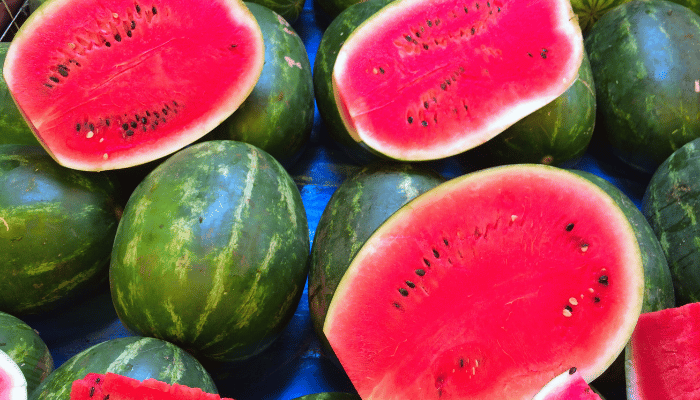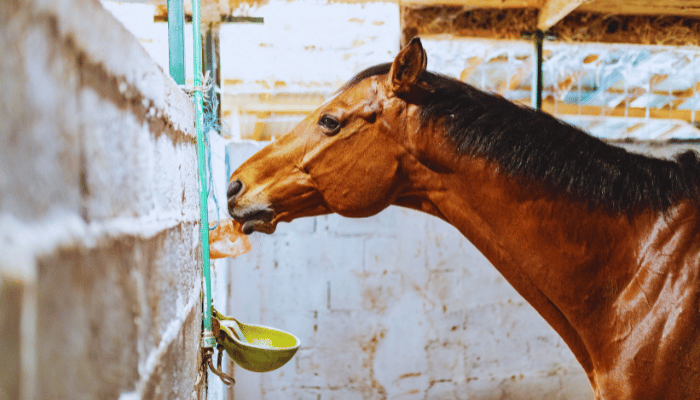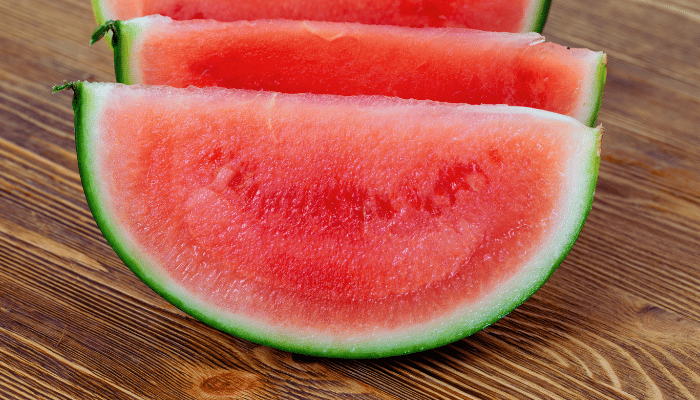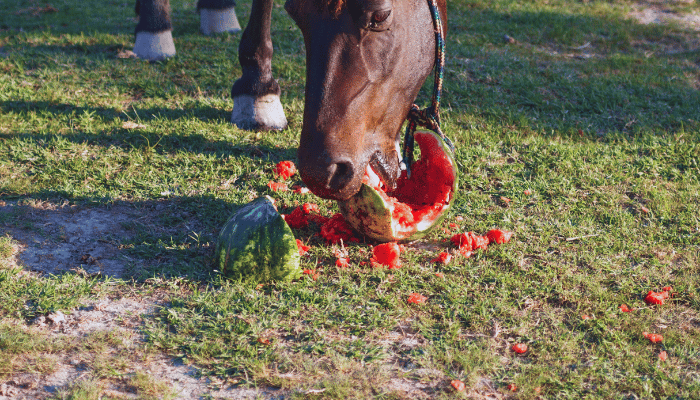As summer blazes on, horse owners are often caught in a dilemma: how to keep their equine companions cool, hydrated, and happy. You might have pondered, “Can horses eat watermelon?” After all, this juicy fruit is a refreshing delight for humans—but does it hold the same promise for your beloved horse?
The thought of your horse nibbling on a slice may seem harmless, yet questions about potential risks can stir unease. Could the rind cause digestive issues? Is the sugar content too high for sensitive equine stomachs?
Here’s the good news: when offered thoughtfully, watermelon can be a safe and nourishing summer treat for horses. This guide will explore the dos and don’ts, ensuring you can confidently introduce this hydrating fruit into your horse’s diet without worry. Let’s dive into why watermelon might just be the perfect way to sweeten your horse’s summer days.
Exploring Feeding Watermelon to Horses

Incorporating watermelon into a horse’s diet can be both safe and beneficial when done correctly. Let’s discuss the safety aspects, benefits, and how to introduce this juicy treat gradually to your equine friends.
Safety and Benefits of Watermelon
Watermelon is generally safe for most horses to eat. It offers several nutritional advantages, including vitamins A and C, magnesium, phosphorus, and citrulline, an amino acid that converts to arginine in a horse’s body, producing nitric oxide. Additionally, the high water content in watermelon helps keep horses hydrated, especially during the hot summer months.
Nutritional Content of Watermelon
| Nutrient | Benefit |
|---|---|
| Vitamin A | Supports immune function |
| Vitamin C | Antioxidant properties, immune support |
| Magnesium | Bone health |
| Potassium | Electrolyte balance |
| Citrulline | Converts to arginine for nitric oxide production |
The rind of the watermelon is also safe for horses to consume in small quantities along with the flesh and seeds (source). When feeding watermelon, moderation is recommended, particularly as a treat or reward, to ensure it does not constitute a significant portion of your horse’s daily intake.
Introducing Watermelon Gradually
When introducing watermelon or any new food to a horse’s diet, it’s essential to do so gradually. Start by offering a small piece of watermelon and observe the horse for any adverse reactions. Gradual introduction helps the horse’s digestive system adjust to the new treat without causing digestive upset.
- Start Small: Begin with a small piece of watermelon.
- Observe: Monitor the horse for any signs of digestive issues or allergic reactions.
- Gradual Increase: If no adverse reactions occur, gradually increase the amount over several days.
For more treats ideas for horses, check out our articles on whether can horses eat bananas, can horses eat apples, and can horses eat grapes.
By following these guidelines, you can safely and effectively incorporate watermelon into your horse’s diet, providing them with a delicious and nutritious treat.
Understanding Nutritional Value

Exploring the nutritional aspects of watermelon is key to understanding its benefits for horses. Here, we delve into both the vitamin and mineral content as well as the sugar concerns associated with feeding watermelon.
Vitamin and Mineral Content
Watermelon is rich in essential vitamins and minerals that can provide several benefits for your equine friends (Horse and Hound). The fruit is composed mostly of water, but it also contains a variety of nutrients:
- Vitamin A: Vital for eye health and immune function.
- Vitamin C: Acts as an antioxidant and supports collagen formation.
- Potassium: Essential for muscle function and maintaining electrolyte balance.
- Magnesium: Helps with muscle relaxation and nerve function.
- Phosphorus: Important for bone health.
Moreover, the rind of the watermelon is a rich source of fiber and citrulline, an amino acid that converts to arginine in the horse’s body, aiding blood flow by producing nitric oxide (Equine Institute, Horse and Hound).
| Nutrient | Benefit |
|---|---|
| Vitamin A | Eye health, immune function |
| Vitamin C | Antioxidant, collagen support |
| Potassium | Muscle function, electrolytes |
| Magnesium | Muscle relaxation, nerve function |
| Phosphorus | Bone health |
Sugar Content Concern
While watermelon offers numerous nutritional benefits, it’s also important to be mindful of its sugar content. Watermelon is about 90% water, providing hydration benefits, but the remaining 10% consists mainly of sugars (Bay Area Equestrian Network). Excessive sugar intake can lead to health issues such as insulin resistance and laminitis, conditions that horse owners need to monitor carefully.
| Component | Percentage |
|---|---|
| Water | 90% |
| Sugar | 10% |
To mitigate these risks, it is advisable to feed watermelon in moderation. Introduce it as a treat rather than a staple in their diet. For advice on how to monitor and manage treat feeding, feel free to check our guide on moderation in treat feeding.
For other suitable treats and their nutritional impacts, explore our guides on can horses eat bananas, can horses eat celery, and can horses eat grapes.
By giving attention to both the benefits and concerns associated with watermelon, horse owners can make informed decisions about incorporating this treat into their horse’s diet. This understanding leads to healthier, happier horses.
Serving Watermelon to Horses

Preparation and Serving Tips
When serving watermelon to horses, it’s important to follow a few key guidelines to ensure that they enjoy the treat safely.
Remove Seeds: Seeds can pose a choking hazard and may cause intestinal blockages. Always remove the seeds before offering watermelon to your horse (Equine Institute).
Limit the Rind: While the rind is not toxic, it can be difficult for horses to digest. Limit the amount of rind you offer and focus on the juicy flesh.
Cut into Small Portions: To prevent choking hazards, cut the watermelon into small, manageable pieces (Equine Institute).
Feed in Moderation: Watermelon should be a treat, not a staple of their diet. Feeding in moderation ensures that horses do not consume too much sugar, which can lead to various health issues.
Potential Risks and Considerations
Feeding watermelon to horses comes with certain risks that need to be considered:
High Sugar Content: Watermelon contains a significant amount of sugar, which can pose a problem for horses with metabolic issues such as insulin resistance. Overweight horses or those prone to laminitis should have limited access to sugary treats (Bay Area Equestrian Network).
Choking Hazards: Large pieces and seeds can become choking hazards. Always ensure that the watermelon is appropriately prepared and cut into small pieces (Equine Institute).
Digestive Upset: Feeding large quantities of watermelon can cause digestive upset, including colic. Gradually introduce watermelon into your horse’s diet to monitor for any adverse reactions.
Special Populations: Senior horses or those with specific health conditions like HYPP (Hyperkalemic Periodic Paralysis) require tailored consideration. Consult a veterinarian before offering watermelon to these groups.
| Potential Risk | Description |
|---|---|
| High Sugar Content | Can lead to laminitis, colic, and issues for insulin-resistant horses. |
| Choking Hazards | Seeds and large pieces can cause choking or blockages. |
| Digestive Upset | Overconsumption may result in colic or other digestive issues. |
| Special Populations | Senior horses or those with specific health conditions may need tailored considerations. |
When it comes to serving watermelon, keeping these tips and potential risks in mind will help ensure your horse safely enjoys this refreshing summer treat. For other fruity options, check out can horses eat bananas and can horses eat apples.
Moderation and Monitoring
Feeding watermelon to horses can be a delightful summer treat, but it’s essential to practice moderation and monitor their reactions to maintain their health and well-being.
Moderation in Treat Feeding
Watermelon, comprising approximately 90% water and 10% sugar, offers nutritional benefits for horses but should be fed in moderation (Horse & Hound). The high water content can be hydrating, but the sugar levels require careful consideration, especially for horses prone to conditions like insulin resistance or laminitis.
Guideline for Watermelon Feeding:
| Horse Size | Recommended Serving |
|---|---|
| Small (under 900 lbs) | 1-2 small slices |
| Medium (900-1,200 lbs) | 2-3 small slices |
| Large (over 1,200 lbs) | 3-4 small slices |
Feeding watermelon as an occasional treat or reward helps curb the amount being fed and prevents potential health issues. For more on different treats, check out our articles on can horses eat bananas and can horses eat grapes.
Monitoring for Reactions
While watermelon can be a safe and enjoyable addition to a horse’s diet, monitoring for any adverse reactions is crucial. Horses may exhibit signs of digestive upset, choking, or allergies when introduced to new foods.
Signs to Watch For:
- Diarrhea or loose stools
- Decreased appetite
- Signs of discomfort or colic
- Allergic reactions such as hives or itching
If any of these symptoms occur, discontinue feeding watermelon immediately and consult a veterinarian. Regular monitoring ensures that your horse enjoys their treat without compromising their health. Always introduce new foods gradually, observing their response before making it a regular part of their diet.
Learn more about horse health and feeding practices in our other articles, such as can horses eat pumpkins and can horses eat apples for a varied and nutritious diet.

